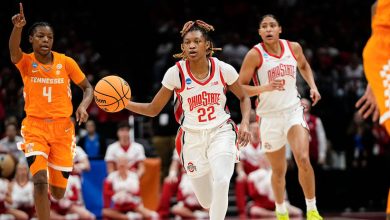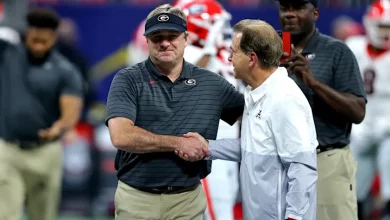Malaki Starks showed his leadership at Rookie Minicamp

Malaki Starks made an immediate impression during Rookie Minicamp, showcasing not only his physical skills and football intelligence but also a level of leadership that stands out among his peers. For a rookie entering the NFL, the transition from college to the professional level can be daunting, but Starks approached this critical first step with confidence, maturity, and a clear sense of purpose. His presence at minicamp quickly became a defining story, highlighting how leadership — beyond raw talent — is a crucial ingredient for success in the league.
Leadership in football, especially for young players, is often measured by how a player carries himself on and off the field. Malaki Starks, a safety with a reputation for toughness and savvy football instincts, demonstrated these qualities from the very first day. Coaches, teammates, and staff all noted his composure under pressure, his willingness to communicate openly, and his proactive approach to helping others adjust. In a room filled with talented rookies eager to prove themselves, Starks’ ability to rise above and set a tone speaks volumes about his character.
Starks’ football journey began long before reaching the NFL, and understanding his background provides insight into why leadership comes naturally to him. Coming out of college, he was known not just for his athleticism and ball skills but for being a student of the game — someone who studies film, understands schemes, and makes smart decisions. This intellectual approach to football, combined with a work ethic honed over years of competition, positioned him as a natural leader even before stepping onto the professional stage.
At Rookie Minicamp, where many players are still finding their footing, Starks wasted no time stepping into a leadership role. Whether it was during walkthroughs, drills, or team meetings, he was often one of the first to offer encouragement and constructive feedback. Teammates appreciated his approachability and the way he helped others stay focused and motivated through the intense schedule. Leadership isn’t just about being loud or commanding; it’s about fostering trust and bringing out the best in those around you — qualities Starks clearly displayed.
One key aspect of Starks’ leadership was his ability to lead by example. On the practice field, he worked tirelessly to refine his technique and execution. His commitment to fundamentals, from footwork to tackling form, was evident. Coaches praised his attention to detail and the fact that he was always looking for ways to improve. This attitude created a ripple effect in the minicamp environment, inspiring others to push harder and hold themselves accountable.
Moreover, Starks’ leadership extended beyond individual performance. Defensive backs often rely heavily on communication and trust to operate effectively, especially in complex coverage schemes. Starks’ vocal presence in the secondary helped keep everyone aligned and responsive to in-game adjustments. His ability to read offenses, anticipate plays, and direct teammates is a hallmark of a player with a high football IQ — and a sign of someone comfortable with responsibility.
Coaches particularly noted Starks’ mental toughness during minicamp. The grind of learning a new playbook, adjusting to the speed of the NFL, and competing for a roster spot can be overwhelming. But Starks handled these challenges with a level-headed approach. When mistakes happened — as they inevitably do — he treated them as learning opportunities rather than setbacks. This resilience and growth mindset are critical for young players hoping to carve out long careers in the league.
Another facet of Starks’ leadership was his willingness to accept and implement coaching feedback. In a rookie environment, adapting quickly to the professional coaching style is essential. Starks’ openness to correction and his ability to translate feedback into improved play earned him respect from both coaches and fellow players. It’s one thing to have talent; it’s another to consistently improve and adapt at the highest level.
Beyond the technical and mental aspects, Starks’ interpersonal skills helped him build rapport quickly. Football teams are like families, and chemistry within the locker room can significantly impact performance. Starks’ genuine personality and humility helped him connect with veterans and other rookies alike. He didn’t shy away from asking questions or seeking advice, demonstrating humility and a hunger to learn — traits that often accelerate a rookie’s growth.
Starks’ leadership at Rookie Minicamp also reflects the evolving nature of the NFL, where leadership roles are no longer reserved for just the most experienced players. Young players who can lead early bring valuable energy and perspective to the team culture. They help bridge gaps, foster competition, and maintain accountability. In this way, Starks’ impact goes beyond his position; he is helping set a tone for the entire defensive unit.
His leadership also has positive implications for the team’s long-term future. Building a strong defense requires having playmakers who can take charge and rally their teammates. A player like Starks, who demonstrates leadership early on, is likely to become a cornerstone of the defense. Coaches and front office executives are well aware of the intangible value leaders bring, and Starks’ performance at minicamp sends a strong signal about his potential to be a foundational player.
In addition to leadership, Starks’ physical play during minicamp was impressive. He showed good range, fluid movement in coverage, and reliable tackling skills. These physical attributes, combined with his mental acumen and leadership traits, paint the picture of a well-rounded safety capable of contributing in multiple facets of the game. His instincts in reading the quarterback and jumping routes stood out, as did his ability to react quickly to screens and run support situations.
Starks’ performance also included flashes of the aggression necessary for a safety in today’s NFL. Modern defenses demand safeties who can be both cover players and run-stoppers, capable of executing complex responsibilities. Starks demonstrated a willingness to engage physically in the run game without hesitation and to deliver punishing hits when opportunities arose. This aggressive style, balanced with sound technique, enhances his value as a defensive back who can disrupt offenses.
Rookie Minicamp, while a relatively short window, serves as an important foundation for the grueling training camps and long seasons that follow. For Malaki Starks, his leadership and play during this phase have set a positive trajectory. The early trust he has earned from coaches and teammates will likely lead to more opportunities to grow and compete in upcoming practices and preseason games.
Looking ahead, Starks will need to continue building on this strong start. The NFL is a league where consistency and continual growth determine a player’s longevity. The leadership he showed at Rookie Minicamp will be tested as the pace and physicality increase. However, the foundation he has laid — grounded in hard work, mental toughness, communication, and teamwork — will serve him well.
Fans and analysts are already taking notice. Early buzz around Starks highlights him as a player to watch, not just for his skills but for the impact he could have as a leader on and off the field. His ability to connect with teammates and coaches, combined with his football talents, makes him a promising prospect with the potential to grow into a key defensive piece.
The importance of leadership in the NFL cannot be overstated. Teams that cultivate strong leaders often find themselves better equipped to navigate adversity and maintain high standards. For a young player like Malaki Starks, earning that reputation early is a significant achievement. It shows he understands the broader picture — that success is about more than individual stats or highlight plays. It’s about being part of a collective effort, driving others forward, and holding oneself accountable.
In summary, Malaki Starks’ leadership at Rookie Minicamp was a standout feature that complemented his physical and mental attributes. His ability to lead by example, communicate effectively, handle pressure with poise, and build relationships has already made a positive impression. As the team moves forward into the more intense phases of preparation, Starks’ leadership qualities will be invaluable. Whether he’s on the field making key plays or off the field setting a standard, his presence promises to be a vital part of the team’s foundation in the years to come.









